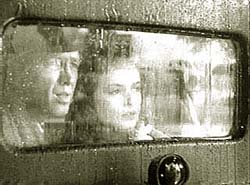[Illuminating comparisons within. Also, spoilers.]
"Who can take a rainbow," and steal it from the shining edible world of Willy Wonka? Johnny Depp and Tim Burton can. While a lot of sweet and salty tidbits emerge whole from Roald Dahl's book in this new version of the movie (or remake, if you like. They're that similar.), Willy Wonka is creepy. Not that it would matter, if Depp's boy-man characterization helped move the story forward.
Digression: Why is this movie being so well reviewed? It's a visual feast -- a faithful, inventive, by turns edgy and gross-out realization of Dahl's original candy recipe. Love the story: see the movie, with a wildly more conflicted Wonka, and a much richer character in Charlie. And this version comes at a time when parents are child-obsessed. It's a delight to watch spoiled children and their parents suffer the consequences of their choices.
Not much moves this, or the original, story forward. This is why filmmakers may like it so much. There is so much to see and so few story threads to manage. First, children vie to find five golden prize tickets. Then they follow Wonka's whims on a magical mystery factory tour. The two film Wonka's try to add interest using different strategies, though the older is better.
In the Mel Stuart/Roald Dahl/Gene Wilder version (1971), Wonka cleverly stages a test. Charlie and Grandpa Joe break the factory rules, but Charlie redeems himself by giving up a top-secret candy sample that rival Slugworth would have paid obscenely to reverse engineer. Charlie wins by an act of integrity, even after getting carried away by a little harmless temptation.
In the Tim Burton/Johnny Depp production, Charlie and Grandpa Joe don't break the rules, but Charlie wins by default. Now, by the time Charlie is the last kid standing, we have a lot to like: his generosity, family feeling, lack of shame about eating candy. But he wins because he's not spoiled. He wins by doing nothing, a story shortcoming that must be laid Dahl's feet.
What's new and great: Charlie's poverty is greater this time. So great in fact that we pity him when his father (a character restored to the story) brings home from work a misshapen toothpaste cap and Charlie calls it the perfect gift. But he pulls a model of the Wonka factory from the cupboard - all toothpaste caps - and gives the Wonka figure the top hat he deserves. The image of the model and the revelation perfectly communicates the Buckets' poverty and Charlie's fascination.
During first act exposition, we learn the wonder, and then closing, of the Wonka factory through Grandpa Joe's eyes. Screenwriter John August wrote him as a former employee put out of his job when espionage forced Wonka to hermtically seal the place. And this change gives new weight and interest to Grandpa Joe's desire to return to the factory with Charlie.
Too much has been said elsewhere to comment on how hard it is to find something sympathetic in this entertaining new Willy Wonka. Watching Charlie preside over dinner with all the Buckets and Wonka in the final scene, you can't help but think, "Thank god someone with sense is taking over Neverland."
skip to main |
skip to sidebar

Yes, we have RSS feeds!


A hard look at stories to learn about writing movies

Yes, we have RSS feeds!
Principles
It all started with, "I could write a movie that bad." Turns out, even that's hard. So...
- Appreciate what's admirable.
- Identify what's slack; examine why.
- Think fast and publish quickly because writing stories, not blogging, is the real deal.
Affirmations (or "Get off your ass!")
Luck is opportunity plus preparation plus luck. - Jane Espenson ~~ Don't let better be the enemy of good. - John August ~~ The business must eat stories. Don't wait. - Eric Jacobson ~~ The screenplay is a container for money. - John David Roberts ~~ Things are OK when the things you complain about are the things you used to dream about. - Aaron Sorkin
About Me

- John David Roberts
- I'm an experienced learning and OD professional, who's onto the what's new in learning, and in my few hours of spare time I write screenplays.
Seen and Read, 2007 (Screenwriter)
- Jimmy the Gent (Bertram Milhauser)
- To Be or Not to Be (Edwin Justus Mayer)
- The Cabinet of Dr. Caligari (1962, Robert Bloch)
- Notorious (Ben Hecht)
- The Treasure of Sierra Madre (John Huston)
- Down in the Valley (David Jacobson)
- Daddy Long Legs (Henry Ephron, Phoebe Ephron, Jean Webster)
- The Bells of St Mary's (Leo McCarey, Dudley Nichols)
- The Bishop's Wife (Leonardo Bercovici, Charles Brackett, Robert E Sherwood, Billy Wilder)
- Atonement (Christopher Hampton)
- Breach (Adam Mazer, Wm. Rotko, Billy Ray)
- Charlie Wilson's War (Aaron Sorkin)
- Enchanted (Bill Kelly)
- Disturbia (Christopher B Landon, Carl Elsworth)
- Because I Said So (Karen Leigh Hopkins, Jessie Nelson)
- Freaks (Clarence Aaron Robbins)
- Hollywoodland (Peter Bernbaum)
- My Super Ex-Girlfriend (Don Payne)
- The Bourne Ultimatum (Tony Gilroy, Scott Z. Burns, George Nofli)
- Sicko (Michael Moore)
- Knocked Up (Judd Apatow)
- The Island (Caspian Tredwell-Owen, Roberto Orci and Alex Kurtzman)
- The Princess Bride (William Goldman)
- The Wizard of Oz (Noel Langley, Florence Ryerson, Edgar Allen Woolf)
- Ocean's Thirteen (Brian Koppelman, David Levien)
- Broken Flowers (Jim Jarmusch)
- Live Free or Die Hard (Mark Bomback)
- Local Hero (Bill Forsyth)
- Hot Fuzz (Edgar Wright, Simon Pegg)
- Shrek the Third (Andrew Adamson, Howard Gould, Jeffrey Price, Peter S. Seaman, J. David Stern, David N. Weiss, Jon Zack)
- One Crazy Summer (Savage Steve Holland)
- Severance (James Moran, Christopher Smith)
- The Science of Sleep (Michel Gondry)
- Spider Man 3 (Sam and Ivan Raimi, Alvin Sargent)
- The Lives of Others (Florian Henckel von Donnersmarck)
- Jesus Camp (Heidi Ewing, Rachel Grady, dirs.)
- The Holiday (Nancy Meyers)
- Stranger than Fiction (Zach Helm)
- On Broadway (Dave McLaughlin)
- The Pursuit of Happyness (Steve Conrad)
- The Namesake (Sooni Taraporevala)
- The Last King of Scotland (Jeremy Brock, Peter Morgan)
- The Devil Wears Prada (Aline Brosh McKenna)
- The Knack...and How to Get It (Charles Wood)
- Borat (Sacha Baron Cohen, Anthony Hines, Peter Baynham, Dan Mazer)
- The Departed ( William Monahan)
- Zodiac (James Vanderbilt)
- Children of Men (Alfonson Cuaron, Timothy Sexton, David Arata, Mark Fergus, Hawk Otsby)
- The Chronicles of Narnia (Ann Peacock, Andrew Adamson, Christopher Markus, Stephen McFeely)
- The Incredibles (Brad Bird)
- The Goonies (Chris Columbus)
- Letters from Iwo Jima (Iris Yamashita)
- Flags of Our Fathers (Wm. Broyles Jr., Paul Haggis)
- Night at the Museum (Ben Garant, Thomas Lennon)
- Notes on a Scandal (Patrick Marber)
- Man on Fire (Brian Helgeland)
- Pan's Labyrinth (Guillermo del Toro)
- The Painted Veil (Ron Nyswaner)
- Babel (Guillermo Arriaga)
- Blood Diamond (Charles Leavitt)
- The Queen (Peter Morgan)
Screenwriting Bloggers
Labels
- blog news (2)
- comedy (2)
- 2008 awards (1)
- Apatow (1)
- Bateman (1)
- Bill Forsyth (1)
- Bill Kelly (1)
- Christmas (1)
- Dan in Real Life (1)
- Die Hard (1)
- Disturbia (1)
- Enchanted (1)
- Gondry (1)
- Heigl (1)
- Hot Fuzz (1)
- Mira Nair (1)
- Paul Fieg (1)
- Peter Hedges (1)
- Rear Window (1)
- Rogen (1)
- Tambor (1)
- airport (1)
- character (1)
- dream (1)
- genre update (1)
- goal (1)
- heroes (1)
- horror (1)
- ignorance (1)
- irony (1)
- parallel story (1)
- sincerity (1)
- slasher (1)
- sleep (1)
- story (1)
- thriller (1)
- town vs corp. (1)

No comments:
Post a Comment